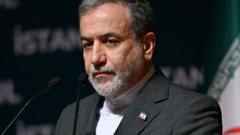Gwede Mantashe, ANC National Chair, emphasized South Africa's sovereignty in the face of American criticism regarding recent land reforms. Tensions escalated following an executive order from former President Trump, which condemned South Africa's new expropriation law aimed at addressing historical injustices. The ANC party and President Cyril Ramaphosa are seeking diplomatic solutions while addressing internal calls for clearer racial equity in property ownership.
South Africa Asserts Sovereignty Amid US Tensions and Land Reforms

South Africa Asserts Sovereignty Amid US Tensions and Land Reforms
ANC leaders affirm independence as tensions rise over land expropriation laws and race relations with the United States.
South Africa's ruling African National Congress (ANC) has publicly defended its sovereignty as tensions with the United States escalate concerning race relations and a controversial land expropriation law. Gwede Mantashe, the ANC's National Chairperson, proclaimed the country's independence, stating, "We are a free country, we're a sovereign country. We're not a province of the United States and that sovereignty will be defended." His comments come in the wake of criticism from former US President Donald Trump regarding South Africa's new land reform policy.
Trump's executive order issued earlier in the year condemned the expropriation law, labeling it a framework that potentially allows the South African government to "seize ethnic minority Afrikaners' agricultural property without compensation." Conversely, President Cyril Ramaphosa defended the legislation as a means to ensure "public access to land in an equitable and just manner." Under this law, although land can technically be seized without compensation, it is only permitted under prescribed circumstances.
Tensions have deepened as nearly 70,000 South Africans have expressed interest in seeking asylum in the US. Trump's executive order has also signaled potential opportunities for Afrikaners to be recognized as refugees, framing them as victims of "unjust racial discrimination." Addressing Freedom Day celebrations, Mantashe criticized calls from certain citizens urging Trump to "punish" South Africa, noting, "Now they are told to go there and be refugees, they are refusing. They must go."
Discussions of land ownership have also permeated social media platforms, with figures such as Elon Musk publicly declaring South Africa's ownership laws to be "racist." Though white South Africans represent a minority, they predominantly hold the majority of private land and economic wealth, a remnant of apartheid's racially divisive legacy.
In an attempt to mitigate the ongoing tensions, South Africa appointed a special envoy to Washington, Mcebisi Jonas, tasked with furthering the nation's diplomatic and trade interests. This move follows the expulsion of South Africa's ambassador, Ebrahim Rasool, after he accused Trump of employing "dog whistle" politics.
The complexities of land ownership and race relations have further been underscored by visits from representatives of Orania, an all-white separatist community aiming for recognition as an autonomous state. In his remarks, Mantashe suggested integrating this community with others, stating, "Black people must go and build there, and we mix them," while asserting that "hatred can never survive peace." South African leaders are navigating a challenging landscape as they balance national sovereignty, racial equity, and the push for diplomatic relations with the United States.




















